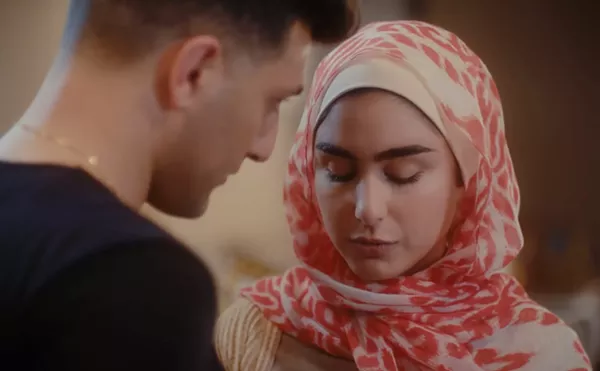
Audio By Carbonatix
[
{
"name": "GPT - Leaderboard - Inline - Content",
"component": "35519556",
"insertPoint": "5th",
"startingPoint": "3",
"requiredCountToDisplay": "3",
"maxInsertions": 100,
"adList": [
{
"adPreset": "LeaderboardInline"
}
]
}
]
Right from the beginning, as dark clouds swirl around the Warner Brothers logo and the fanfare takes on an ominous tone, it's clear that Harry Potter and the Order of the Phoenix has left the dewy-eyed awe of childhood magic and entered the brooding angst of adolescent powerlessness.
Over the last four films, we've watched Harry grow from an insecure neophyte marveling at the wonder of magic into a focused young man who understands that sorcery is something dangerous. Director David Yates underlines this realization by delivering the gloomiest installment in the Potter series yet. Embracing the essential Englishness of Rowling's stories and evoking the angry young men of late '60s British cinema, Harry is alienated and exhausted. The unrelenting attacks and loss of family and friends have taken a profound emotional toll.
Depressed by schoolmate Diggory's death at the end of The Goblet of Fire, Harry (Daniel Radcliffe) is accused by the Ministry of Magic of lying about his confrontation with Lord Voldemort (Ralph Fiennes). Though his friends stand by him, the adults refuse to believe him and most of Hogwarts' students treat him like a leper. Worse, the minister, paranoid Dumbledore (Michael Gambon), is out to make things difficult for Harry, and sends Dolores Umbridge (Imelda Staunton) to the school as its Homeland Security director ... er ... Grand Inquisitor.
Before long, Dumbledore's plan backfires, and creepy but prim Dolores ousts him, takes control of the school and trains her sights on Harry. Meanwhile, Voldemort and his legion of Death Eaters are on the move and Harry must teach his fellow students how to defend themselves against the gathering dark forces. Unfortunately, Umbridge is determined to put an end to his secret magic lessons while Voldemort seeks the prophecy that may end Harry's life.
Clearly a transitional work, Order of the Phoenix conveys a great deal of exposition and suffers from an episodic narrative that suggests many of the 800-plus-page book's subplots and flourishes had to be jettisoned to keep the movie down to 2-1/2 hours. Still, while this may be the first Harry Potter movie unable to stand on its own — there are too many references to earlier characters and situations — it's the first one that's epic in scope. The importance of supporting characters becomes clearer even as the film's focus narrows on Harry.
There's a gathering storm quality to the events that suggests a monstrous confrontation looms and Michael Goldenberg's lucid and fleet-footed adaptation (the first in the series not scripted by Steve Kloves) unfolds with terrifying momentum, resulting in a compelling and emotionally resonant film.
By their very nature, the Harry Potter films are constrained by compromise. Because of their connection to the books, each film comes to a predictable and, often, upbeat conclusion. It's to Yates and Goldenberg's considerable credit that this installment leaves you with a feeling of loss and isolation long after the credits roll.
And just as the characters in Harry Potter have matured, the films, too, have matured in depth and style. With each new movie, the directors seem less intimidated by the books and freer to impose their own artistic sensibilities. Alfonso Cuarón (The Prisoner of Azkaban) could probably be credited with giving the series a stylistic kick in the pants and Yates is clearly building on that freedom. He may not have Cuaron's filmmaking prowess, but he gives Order of the Phoenix greater substance, deepening the characters' relationships and emotions. Visually, he finds the perfect match with Polish cinematographer Slawomir Idziak (Blue, The Double Life of Véronique), who gives Yates' vision a malevolently lush palette of grays and blues, providing yet another layer of subtext.
Like the previous films, Yates fills his supporting cast with a who's who of great British actors. Emma Thompson, Maggie Smith, Robbie Coltrane, Brendan Gleeson, Helena Bonham Carter, David Thewlis, Alan Rickman and Gary Oldman not only add spice and color, they expertly walk the line between camp and conviction. Fiennes, as the face of evil, chews the scenery with depraved glee but also creates a monster with real weight while Staunton's pink-suited opportunist, Dolores Umbridge, is exquisitely tyrannical.
With the younger cast members, it's been interesting to watch them grow up over the last six years. Radcliffe and Rupert Grint (as Ron Weasley) have matured into skillful performers while Emma Watson (as Hermione) has finally stopped acting with her eyebrows.
Unlike this summer's other blockbusters, Order of the Phoenix won't blow you away you with bombast and spectacle; though there are moments — particularly a sorcerer's showdown between Dumbledore and Voldemort — that are remarkably exciting. Instead, the film dramatically satisfies in a way those other high-profile ones fail, offering a tale that leaves you hungering for the next installment. Only 18 months to go.
Jeff Meyers writes about film for Metro Times. Send comments to letters@metrotimes.com.





